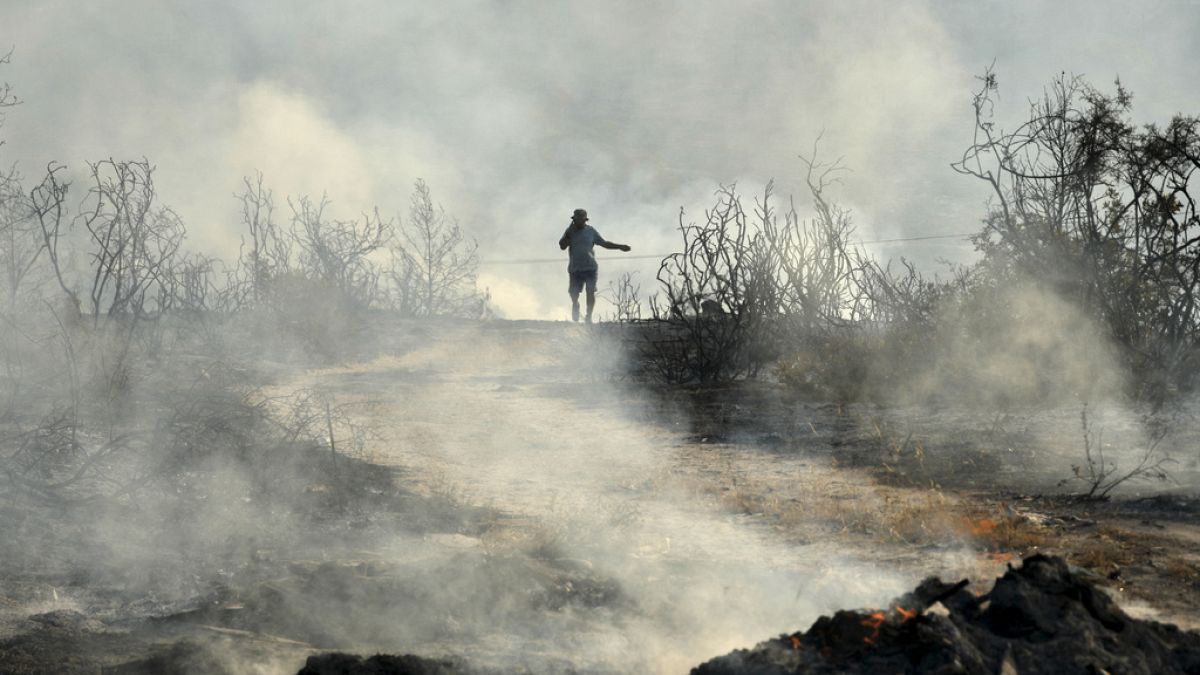A devastating wildfire is currently ravaging parts of Cyprus, particularly in the picturesque region near Limassol. The catastrophic blaze has obliterated homes and threatened local communities, leading
Did You Know
There’s a species of jellyfish that’s immortal.
?
AD
to the evacuation of over a dozen villages. Amidst the chaos, two bodies have been discovered in a burned-out car, believed to belong to an elderly couple in the Limassol district. This tragic incident underscores the dire human cost of this rapidly worsening situation.
Firefighters are entrenched in a relentless battle against the flames, facing staggering temperatures that have soared to as high as 45 degrees Celsius. The combination of extreme heat and dry conditions has created a perfect storm for wildfires, not only in Cyprus but also across neighboring Turkey. Firefighters are struggling to contain the blaze, which has already scorched nearly 40 square miles of forested land, claiming wildlife and threatening the homes of countless residents who are now unable to return.
The wildfires have led to urgent travel warnings for tourists, casting a shadow over Cyprus’s once-thriving travel industry. Popular holiday destinations are at risk, prompting concerns for the safety of visitors and local residents alike. As emergency responders continue their tireless efforts to combat the fires and protect lives, the community faces an uncertain future, grappling with both immediate devastation and the long-term repercussions of this natural disaster.
Q&A (Auto-generated by AI)
What causes wildfires in Cyprus?
Wildfires in Cyprus are primarily caused by extreme heat, dry conditions, and human activity. The island experiences hot summers, often exceeding 40 degrees Celsius, which creates an environment conducive to wildfires. Factors like drought and strong winds can exacerbate fire conditions. In recent incidents, wildfires were linked to intense heatwaves, which have become more frequent due to climate change.
How do heatwaves affect wildfire spread?
Heatwaves significantly increase the risk of wildfires by drying out vegetation and creating tinderbox conditions. High temperatures can lead to rapid evaporation of moisture in plants, making them more flammable. Additionally, heatwaves can create strong winds, which help spread fires quickly across landscapes, as seen in the recent wildfires in Cyprus and Turkey.
What safety measures are in place for evacuees?
During wildfires, authorities implement evacuation plans to ensure the safety of residents. These measures include alert systems to notify residents of imminent danger, designated evacuation routes, and temporary shelters for displaced individuals. Emergency services coordinate evacuations, often moving people away from affected areas to safer locations, as seen during the recent Cyprus wildfires.
How have past wildfires impacted Cyprus?
Past wildfires in Cyprus have led to significant environmental and economic damage. They have destroyed homes, agricultural land, and natural habitats, impacting local wildlife. Historically, major wildfires have prompted changes in land management and fire prevention strategies. The psychological impact on communities is also profound, as families face loss and displacement.
What role do firefighters play in wildfire control?
Firefighters are crucial in combating wildfires, employing various strategies to control and extinguish flames. They create firebreaks, apply controlled burns, and use water and retardants to suppress fires. Their efforts are essential in protecting lives and property, especially during intense incidents like the recent wildfires in Cyprus, where they battled to contain the flames amid extreme heat.

















